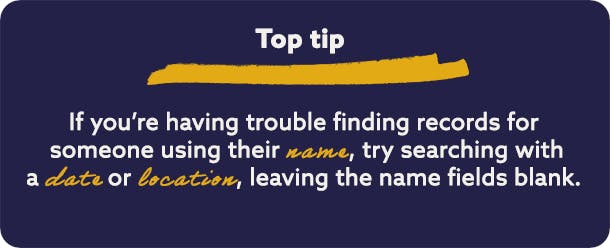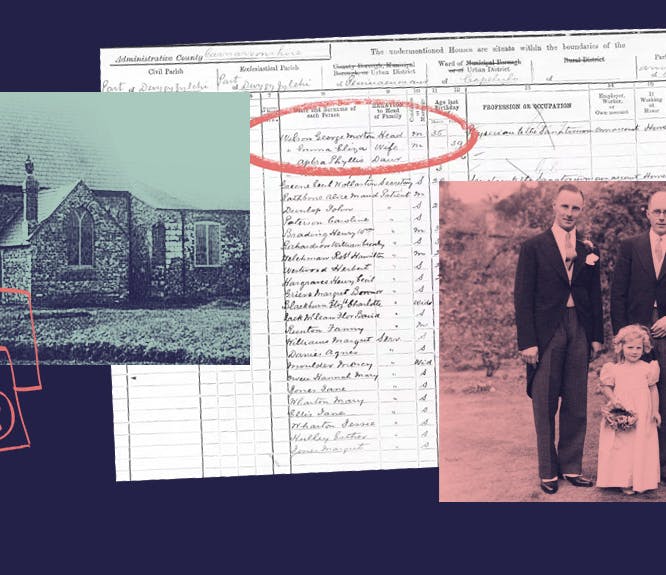Tips and tricks for handling name variations in family history
3-4 minute read
By Guest Author | February 24, 2021

What's in a name? Quite a lot when it comes to family history, actually. Daniel M. Lynch explains how to overcome the most common challenges genealogists face with name variations.
From census records to passenger lists many of our favorite sources for family information captured a variety of spellings, handwritings, and abbreviations. As those historical collections have been digitized and transcribed, modern-day technicians may struggle to correctly interpret and preserve an entry from long ago.
Search family records now
Enter a few details to see your relatives' records at your fingertips.
For family history enthusiasts in North America, a challenge with name variations rings especially true as we are a continent of immigrants and their descendants. By understanding more about name variants, for both first names, and surnames, you’ll be better equipped to anticipate the challenges and employ the proper strategy to find the person you’re looking for. There are three general categories that contribute to name variants – alternate spellings of surnames, abbreviations of first names, and transcription errors.
Alternate spellings in family surnames
A widespread myth shared among family historians is often used to explain variant spellings of surnames;
"“The government changed the name at Ellis Island.”"
Truth is, passenger lists were created at the port of departure, not upon arrival and there is not a single documented case of a family name being changed at Ellis Island.
Many alternate spellings of surnames have evolved over many generations and differ from one ethnic group to another. Language barriers, literacy, and a desire to be viewed as American shortly after arrival likely account for many of the alternate spellings in use today.
In some cases, the spelling variations are simple and subtle (e.g. – Phalen spelled as Phelan), in other cases the removal of a space or changing of one letter can also seem simple but have a big impact (e.g. – La Sorda, Lasorda, Lo Sardo, Losardo). Even some members within the same family adopted different spelling variations (e.g. – O’Rourke vs. Rourke).
Single character wildcards can be used to accommodate for these name variants while searching (e.g. – L?s?rd? would capture Lasorda and Losardo). If your family history research includes one or more surnames prone to multiple spelling variants, consider how you can use wild cards or advanced search filters to locate those ancestors.
Abbreviations in first names
Abbreviations are more commonly found in association with given names rather than surnames. While there were no set standards in place, most abbreviations are easily interpreted. Certain names, however, have more than one variation making it more difficult to search an online index without using some form of wildcard or other filter to capture all possible variants.
For example:
- William was often abbreviated as Wm
- Thomas as Thos or Tom
- Patrick as Pat or Patk or Patr
- Daniel as Dan or Danl or Danny
- Margaret as Maggie
- Elizabeth as Beth or Eliza
When searching for an ancestor, be mindful that an exact search for a given name may unintentionally hide an ancestor from view if the original record or transcription used an abbreviation. Use Findmypast's name variant tool to overcome this problem. It takes different name variations into account when searching.

Also, try using a wildcard (e.g. – Pa* to find any name beginning with “Pa,”) followed by any combination of letters. This will work for many, but not all abbreviations (e.g. – Lizzie as an abbreviation for Elizabeth).
Transcription errors
In addition to alternate spellings and abbreviations, one unintended source of name variations ties to keystroke errors made during the transcription process. As technicians transcribe family history records, they seek to preserve content exactly as it appears in the historical original. Despite best efforts, errors do occur and names can be unintentionally altered. If this mistake occurs for the lead letter of a given name or surname of an ancestor, it can have a significant impact by excluding the record from search results.

If you encounter difficulties searching for an ancestor, particularly if your search yields zero results, be sure to make the most of the advanced search features and wild card search capabilities that Findmypast provides. We're here to help connect you to your family stories and make it as easy possible.
Related articles recommended for you

Search new Scottish records this Findmypast Friday
What's New?

Here's how to research the double-barrelled surnames in your family tree
Help Hub

Revel in all things Northampton this Findmypast Friday
What's New?

